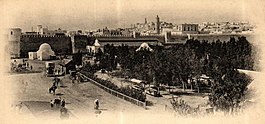Sousse–Kairouan Decauville railway
| Sousse–Kairouan Decauville railway | |||||||||||||||||||||||||||||||||
|---|---|---|---|---|---|---|---|---|---|---|---|---|---|---|---|---|---|---|---|---|---|---|---|---|---|---|---|---|---|---|---|---|---|
 | |||||||||||||||||||||||||||||||||
| Technical | |||||||||||||||||||||||||||||||||
| Line length | 64 kilometres (40 mi) | ||||||||||||||||||||||||||||||||
| Track gauge | 600 mm (1 ft 11+5⁄8 in) | ||||||||||||||||||||||||||||||||
| |||||||||||||||||||||||||||||||||
The Sousse–Kairouan Decauville railway was a 64 km (40 mi) long 600 mm (1 ft 11+5⁄8 in) gauge Decauville military railway from Sousse to Kairouan in Tunisia. It operated from 1882 to 1896, before it was re-gauged to 1,000 mm (3 ft 3+3⁄8 in).
History
[edit]The French army occupied Kairouan in 1881. Pioneers then built the narrow gauge railway from Sousse on the coast to the former capital Kairouan within 3½ months.[1][2] It ran mainly on an old Roman road.[3]
The open-sided carriages arrived before 1 January 1882 in Sousse.[4] The first train transported wounded soldieres on 3 February 1882 from Kairouan to Sousse. The waggons were initially drawn by horses and later by steam locomotives. The railway was regauged from 600 mm (1 ft 11+5⁄8 in) to 1,000 mm (3 ft 3+3⁄8 in) gauge in 1896.[1]
External links
[edit]References
[edit]- ^ a b Rudolf Barth: Strecke im Wartestand: (Henchir Souatir –) Kasserine – Sbeitla – Kalaa Sghira (– Sousse).
- ^ Victor Cambon (1852-1927): De Bone à Tunis, Sousse et Kairouan. 2nd edition, 1885 and Collection XIX, 2016.
- ^ Michael Greenhalgh: The Military and Colonial Destruction of the Roman Landscape of North Africa, 1830-1900. Brill, 2014. Page 201.
- ^ François Gressin, Liliane Sekula and Daniel Wurmser: Paul Decauville on a Type 67 waggon, which was subsequently delivered before 1 January 1882 to Sousse. In: Bulletin des Amis du Musée Decauville, No 26/27, March 2003. Page 24.
